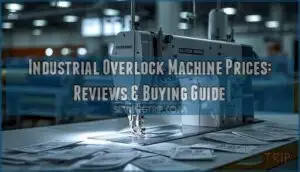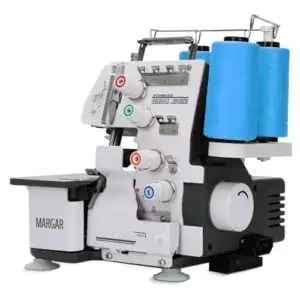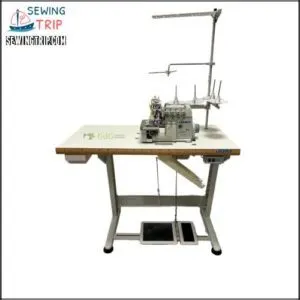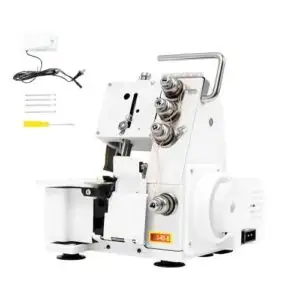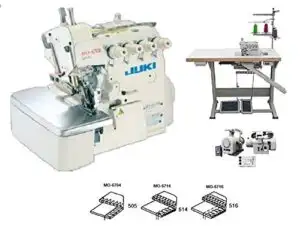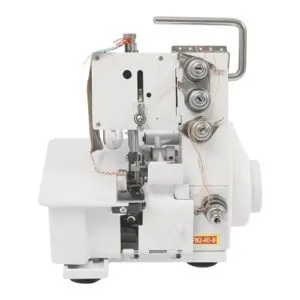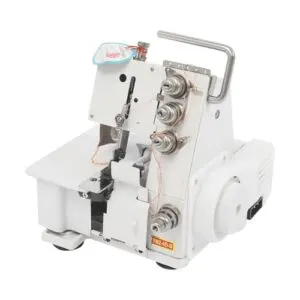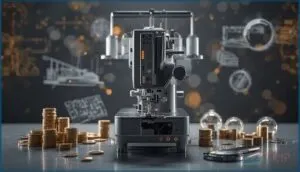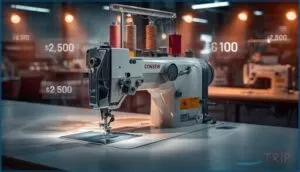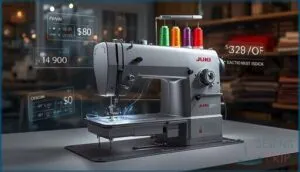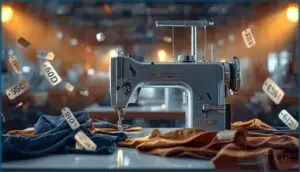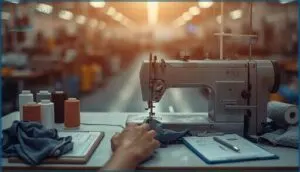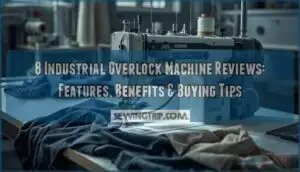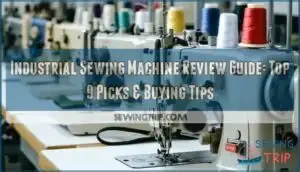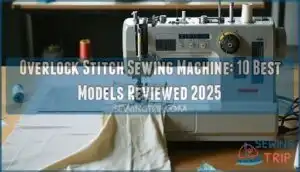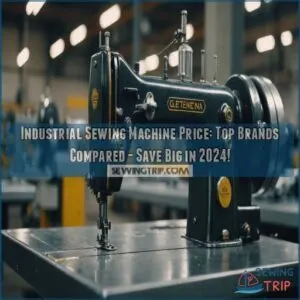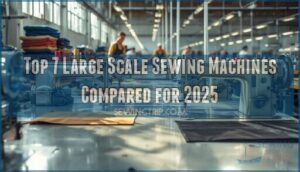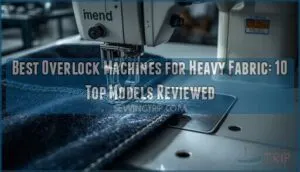This site is supported by our readers. We may earn a commission, at no cost to you, if you purchase through links.
You wouldn’t expect a machine that finishes seams to cost anywhere from $140 to $3,000, but that’s the reality of shopping for an industrial overlock. The price gap isn’t random—it reflects real differences in speed, durability, and features that separate a hobby-level serger from a workhorse that can handle 8,000 stitches per minute in a production environment.
Brand reputation alone can swing the price by 30-50%, while factors like servo motors, differential feed systems, and build quality add hundreds more to the sticker price. Understanding what drives these costs helps you spot the difference between paying for performance and paying for a name badge.
Table Of Contents
Key Takeaways
- Industrial overlock machines range from $140 to $3,000, with entry-level units starting around $200-$400 and professional-grade models from Juki or Pegasus hitting $1,500-$3,000 based on speed, thread count, and automation features.
- Brand reputation drives 30-50% of price differences, while servo motors, differential feed systems, and all-metal construction add another 15-40% to costs—meaning you’re paying for real performance differences, not just a name badge.
- Servo motors cut energy costs by up to 70% compared to clutch systems and deliver speeds ranging from 1,200 to 7,000 stitches per minute, making them worth the extra $400-$700 investment for high-volume production work.
- Total cost of ownership matters more than sticker price—newer models save 446 kWh annually while older machines rack up $1,000+ in yearly downtime costs, and depreciation hits 50% within 3-5 years regardless of brand.
Industrial Overlock Machine Price Ranges
Industrial overlock machines don’t all cost the same—prices shift based on what you’re getting under the hood. You’ll find entry-level units starting around $1,200, while professional-grade machines can push past $3,000.
Let’s break down what separates budget models from premium equipment and where the major brands land on the price spectrum.
Entry-Level Vs. High-End Machine Pricing
When shopping for industrial overlock machines, expect entry-level models to run about $189 to $400—perfect for small shops handling light materials. High-end machines from brands like Juki and Pegasus cost $1,500 to $3,000, offering sophisticated servo motors, 5-6 thread stitch capability, and automation features.
One popular option is the Consew CM793 series, known for its 3, 4, or 5 thread overlock capabilities. Customer reviews confirm this pricing reflects real performance differences in industrial sewing machine sales.
Key Factors Influencing Price Differences
Brand reputation drives about 30-50% of price variation in industrial serger machines. Machine technology—like servo motors and automatic thread trimming—adds 15-35% to costs. Build quality matters too; all-metal construction bumps prices 20-40% higher than composite models. Speed capabilities and support services also influence what you’ll pay.
These factors explain why some overlock machines cost $400 while others hit $3,000 in sewing machine sales. Prices can also vary based on brand and features.
Typical Price Brackets by Brand and Model
Looking at the market, you’ll find distinct Juki price tiers, Consew model costs, and Pegasus pricing levels. Here’s what industrial sewing machines generally cost:
- Entry-level models – Pegasus and generic brands start around $140-$500 for basic overlock machines
- Mid-range Consew Overlock Machines – Professional models span $1,200-$2,000 with solid features
- Premium Juki Industrial sergers – High-spec units range $1,480-$3,000 depending on configuration
- Used machine prices – Expect 25-50% savings on refurbished equipment
- Brand feature impact – Servo motors and multi-needle setups add $300-$500 to base costs
Top Industrial Overlock Machines Reviewed
You’ve seen the price ranges—now let’s look at the machines that deliver real value in today’s market.
We’ve reviewed six industrial overlock models that stand out for their performance, features, and pricing. Each one brings something different to the table, so you can find the right fit for your operation.
1. Pro Serger Heavy Duty Sewing Machine
The Pro Serger Heavy Duty Sewing Machine sits in the $200-$400 price range, making it accessible for commercial sewing equipment buyers. Technical features include a color-coded threading system and 60% larger cutting knife. You’ll get up to 1,300 stitches per minute with 2-4 thread capabilities.
The metal frame build quality ensures stability during heavy-duty projects. Market insights show it’s popular for small-batch garment production. This industrial serger balances performance with usability benefits, handling thick fabrics without sacrificing stitch integrity on your overlock machine projects.
Best For: Professional tailors, small garment businesses, and serious DIY sewers who need a reliable serger that can handle heavy fabrics and high-volume projects without breaking the bank.
- Speed and efficiency with 1,300 stitches per minute and a 60% larger cutting knife that powers through thick, multi-layered fabrics quickly.
- Easy setup thanks to the color-coded threading system and clear guidelines, so you spend less time troubleshooting and more time sewing.
- Solid metal frame construction keeps the machine stable during long sewing sessions and reduces those annoying vibrations and skipped stitches.
- You’ll need to read through the manual and watch the operation video carefully before starting, which adds some setup time for beginners.
- Works best with high-quality thread—cheaper thread can cause tension issues and affect stitch quality.
- Some vibration still occurs during operation despite the rubber base, which might be noticeable during extended use.
2. Juki Industrial Overlock Sewing Machine
The Juki MO6814S stands out as a four-thread industrial overlock machine with servo motor power reaching 7,000 stitches per minute. Key Juki features include differential feed micro-adjustment and backlatching for secure seams.
You’ll find this Juki industrial serger priced between $1,800 and $2,500 for new units, while refurbished options reduce costs considerably. Market demand stays strong among garment manufacturers due to proven durability.
Pricing factors like needle count and automation features separate basic models from high-end industrial sewing machine options. Model comparison reveals substantial performance differences across the lineup.
Best For: Garment manufacturers and professional sewers who need a high-speed, durable machine for handling light to heavy-weight materials with consistent, soft-touch seams.
- Reaches impressive speeds of up to 7,000 stitches per minute with a reliable servo motor, making it ideal for high-volume production work.
- Features differential feed micro-adjustment and backlatching technology that eliminates the need for bartacking while securing seams efficiently.
- Reduces operating noise and delivers superior cost-effectiveness compared to similar industrial models, with prices ranging from $1,800 to $2,500 for new units.
- Assembly can be difficult and time-consuming, with some users reporting inadequate or missing instructions that require patience to work through.
- Some customers have experienced issues with missing parts or incorrect shipments, which can delay setup and use.
- At 150 pounds, the machine’s weight and industrial nature may be overwhelming for hobbyists or those without dedicated workspace.
3. Jaygovan Serger Overlock Sewing Machine
The Jaygovan serger machine delivers 1,200 stitches per minute with its 100W motor performance, making it a solid pick for home workshops and small businesses. You’ll work with 2, 3, or 4-thread configurations on this industrial serger, priced between $250 and $400.
Threading challenges can slow setup, but the cast iron build durability and LED lighting help offset those hurdles.
Market reception highlights excellent stitch quality for the price, though some users recommend professional calibration. This overlock machine works with everything from knits to leather with adjustable differential feed.
Best For: Home sewers and small business owners looking for an affordable industrial-grade serger that handles multiple fabric types without breaking the bank.
- Fast 1,200 stitches per minute with a reliable 100W motor that powers through both delicate and heavy-duty fabrics efficiently.
- Versatile 2/3/4-thread configurations with adjustable differential feed make it adaptable for knits, wovens, and even leather projects.
- Durable cast iron frame construction with built-in LED lighting and automatic trimming blade at a competitive $250-$400 price point.
- Threading the machine can be frustrating and time-consuming, especially for beginners without prior serger experience.
- Initial setup often requires tweaking and professional calibration to achieve optimal stitch quality and smooth operation.
- Build quality doesn’t match higher-end models, and some users report occasional issues with foot controllers and thread guides.
4. Juki MO-6714 Industrial Serger Machine
When speed and precision matter, the JUKI MO6714DA delivers 7,000 stitches per minute—outpacing most industrial sergers in its class. You’ll pay between $1,500 and $1,650 for this 2-needle, 4-thread overlock machine, which manages everything from delicate blouses to denim with its differential feed mechanism.
The direct-drive servo motor cuts energy costs while the semi-dry head design reduces maintenance headaches. Market placement targets mid-to-high production environments, and you get a two-year warranty covering mechanical and electrical components.
Technical specs include adjustable stitch length (1.5-4.0mm) and 7mm presser foot lift—solid capabilities for diverse machine applications in industrial sewing operations.
Best For: High-volume garment manufacturers and production facilities that need industrial-grade speed and precision for light to medium-weight fabrics.
- Blazing fast 7,000 stitches per minute with differential feed that handles everything from delicate silk to denim without breaking a sweat.
- Direct-drive servo motor and semi-dry head design cut your energy bills and maintenance time compared to traditional clutch motors.
- Two-year warranty on mechanical and electrical components gives you peace of mind for a machine built to run all day, every day.
- The $1,500-$1,650 price tag puts it out of reach for hobbyists or occasional sewers who don’t need industrial capacity.
- Assembly required and industrial nature means beginners will face a steep learning curve without prior serger experience.
- Limited to 110V in North America (220-240V elsewhere), so you’ll need to make sure your workspace has the right power setup before buying.
5. Electric Overlock Sewing Machine Four Thread
You’ll find electric four-thread overlock machines spanning $250 to $2,500, depending on whether you need a portable unit or a 4 Thread Highspeed Overlock Industrial Sewing Machine.
Threading complexity frustrates beginners—color-coded systems help, but expect a learning curve. Speed control ranges from 1,200 to 7,000 stitches per minute, with Servo Motor options cutting energy costs by 20-35%.
Stitch quality depends on adjustable tension settings, while fabric handling capabilities stretch from silk to denim. Motor efficiency separates basic Overlock Machine models from professional Sewing Machine Features worth the investment.
Best For: Home sewers and small businesses looking for professional edge finishing on knits and wovens without the cost of a full industrial setup.
- Speed range from 1,200 to 7,000 stitches per minute lets you match the machine to your skill level and production needs, with servo motor models cutting your electricity bill by 20-35%.
- Handles everything from delicate silk to heavy denim thanks to adjustable tension controls, making it versatile enough for garment makers working with multiple fabric types.
- Entry-level models from Brother and Singer start around $250, giving you a low-risk way to test whether overlocking fits your workflow before investing in industrial-grade equipment.
- Threading these machines frustrates beginners even with color-coded guides—expect to watch tutorial videos multiple times and practice before you get consistent results.
- Quality control varies wildly across brands, with some units arriving damaged or requiring immediate tension adjustments that aren’t covered clearly in the manuals.
- The 110V limitation means you’ll need a voltage converter if you’re outside North America, adding $50-150 to your setup cost and another potential failure point.
6. Serger Sewing Machine with LED Light
LED brightness transforms your workspace when threading needles at 1,300 stitches per minute. You’ll notice LED lamps on serger models like the SINGER S0100 draw just 2W, cutting power consumption by over 98% versus older bulbs.
These industrial sewing equipment upgrades last 15,000+ hours—that’s years before replacement costs hit your budget. Ergonomic benefits include cooler work zones and sharper fabric edge visibility.
For your overlock sewing machine or industrial serger machine, LED lighting isn’t optional—it’s essential for precision work under $350.
Best For: Home sewers and hobbyists who need reliable edge-finishing on varied fabrics without spending over $350 or dealing with commercial-grade complexity.
- High-speed operation at 1,200 stitches per minute with energy-efficient LED lighting that lasts over 15,000 hours and only draws 2W of power.
- Adjustable needle pitch and automatic cloth cutting make it versatile enough for cotton, silk, and denim projects.
- Foot switch control and built-in LED illumination improve comfort during long sewing sessions in any lighting condition.
- Not built for commercial or heavy industrial use, limiting its durability for professional workloads.
- Limited material and construction details raise questions about long-term reliability compared to premium sergers.
- Stitch tension requires manual adjustment between different fabric types, adding a learning curve for beginners.
Essential Features Affecting Overlock Machine Cost
Not all industrial overlock machines are priced the same, and understanding what drives those differences can save you serious money. The features you choose directly impact the sticker price and how well the machine performs for your specific work.
Let’s break down the four main factors that separate budget models from premium workhorses.
Number of Threads and Needles
Thread count and needle configuration directly shape what you’ll pay for an industrial overlock machine. Four-thread models with two needles dominate the market because they deliver enhanced stitch durability—commanding a 25–35% price premium over simpler three-thread setups.
Higher thread consumption in these industrial sewing machines also factors into your long-term operating costs, making needle configuration a critical feature when evaluating overlock machine options.
Servo Motor and Speed Capabilities
Modern machines equipped with an Electronic DC Servo Motor deliver substantial performance gains over traditional clutch systems. You’ll notice energy cost savings of up to 70%, quieter operation, and precise Max Sewing Speed control—ranging from 3,000 to 7,000 stitches per minute for high-speed sewing applications.
Here’s what Servo Motor capabilities mean for your investment:
- Motor Speed Ranges from 200 to 6,500 rpm give you flexibility across fabric weights
- Stitch Quality Impact improves through finer speed regulation and reduced vibration
- Energy Cost Savings considerably lower your monthly operating expenses
- Automation Integration becomes simpler with developed control interfaces
Different Servo Motor Types—brushed versus brushless—affect both upfront pricing and long-term maintenance costs. Brushless models cost more initially but reduce maintenance expenditure and extend machine lifespan.
Differential Feed and Fabric Compatibility
Speed control matters, but so does handling the fabric itself. Your overlock machine’s differential feed adjustment determines whether you’ll battle seam distortion or sail through production runs. Over 95% of industrial sewing machines now include this mechanism, and here’s why you can’t skip it:
| Fabric Type | Feed Ratio Setting | Result You’ll Get |
|---|---|---|
| Stretch knits | 1.7–2.0 | Eliminates fabric slippage, flat seams |
| Cotton blends | 1.2–1.5 | Less than 5% distortion |
| Lightweight fabrics | Below 1.0 | Controlled ruffle effects |
| Heavy denim | 1.0–1.3 | Stable edge finishing |
| Athletic wear | 1.8–2.0 | Perfect seam integrity |
Differential feed prevents up to 100% of seam distortion on knits when set correctly. Machines with programmable mechanisms cut your setup time by 25% during fabric changeovers, giving you real control over fabric finishing techniques. Operators report 30% fewer defects and 20 minutes saved per shift troubleshooting. That’s mastery translated into dollars saved and quality delivered.
Build Quality and Durability
You’ll feel the difference between frame materials the moment you power on. Over 90% of industrial sewing machines use steel or aluminum frames—reinforced builds cut failure rates by 27% annually. Durability translates to operational longevity:
- Component Lifespan: Expect 10–25 years with proper care
- Maintenance Costs: Budget $175–$220 yearly for overlock machine parts
- Warranty Coverage: Branded models report under 6% claims in three years
Quality construction protects your investment.
Comparing Leading Industrial Overlock Brands
Regarding industrial overlock machines, brand reputation and pricing can vary quite a bit. Some manufacturers focus on budget-friendly options, while others emphasize premium features and long-term reliability.
Let’s break down how the leading brands stack up with respect to price and value.
Consew Overlock Machine Price Analysis
Consew overlock machines span $2,500 to over $6,100, depending on thread count and features. Direct drive models with servo motors generally cost $2,500 to $3,000, while basic three-thread industrial sewing machines start near $2,500. High-end models like the P1255RBLH-18-1 reach $6,100.
Feature impact drives price—differential feed and automatic lubrication raise costs. Market trends show Consew’s cost positioning competes closely with comparable brands.
Juki Industrial Serger Price Comparison
Juki vs. Consew pricing reveals interesting differences. Entry-level Juki industrial sergers start around $900 to $1,200, while the popular JUKI MO6814S 4-Thread Overlock Industrial Serger ranges from $1,550 to $2,550. Motor Price Delta greatly affects cost—servo upgrades add $400 to $700.
Regional Price variations exist, but Juki’s cost-effectiveness and 60-70% Resale Value make it competitive. Sewing Machine Financing options expand access to these Industrial Sewing Solutions for businesses seeking Feature Price Impact balance.
Pegasus and Other Major Brands
Pegasus holds a competitive niche in the Brand Market Share alongside giants like Juki and Brother. The Pricing Spectrum for Pegasus sewing machines spans dramatically:
- Entry models: New M900 series units cost $690–$729, making them accessible Industrial Sewing Solutions
- Mid-range Product Variations: Direct drive models run $980–$1,250 for garment production
- Specialized units: Heavy-duty machines reach $7,425–$8,250
Regional Pricing and OEM Orders influence final costs. You’ll find Industrial Sewing Machine Parts availability affects long-term value across Sewing Machine Models.
Tips for Buying an Industrial Overlock Machine
Picking the right industrial overlock machine isn’t just about comparing prices on a spec sheet. You need to think through how the machine fits your actual workflow, what it’ll really cost you over time, and whether you can get help when something goes wrong.
Here’s what to focus on before you commit your budget.
How to Choose The Right Model for Your Needs
Start by matching the machine to your project requirements—speed, fabric weight, and production volume matter most. Feature priorities like differential feed and thread options determine versatility. Don’t overlook ease of use; simpler threading saves downtime. Sustainability and vendor support influence long-term satisfaction.
Here’s how sewing machine specifications compare across commercial sewing needs:
| Overlock Machine Features | Light Fabrics | Heavy Materials |
|---|---|---|
| Thread Count | 2-3 threads | 4-5 threads |
| Speed (sti/min) | 1,500-5,000 | 5,000-7,000 |
| Differential Feed | Standard | Micro-adjustable |
Choose sewing machine models that align with your workflow and growth plans.
Evaluating Total Cost of Ownership
Understanding lifecycle costs puts you ahead of buyers who only consider the sticker price. Energy consumption on newer models can slash 446 kWh annually, while maintenance expenses and depreciation rates impact your bottom line harder than you’d think.
Lifecycle costs matter more than sticker price—newer servo motors can cut your annual energy bill by 446 kWh
- First-year savings: Servo motors cut power bills by up to 71%
- Depreciation reality: Expect 50% value loss within 3-5 years
- Hidden repair costs: Older machines average $1,000+ annually in downtime
Resale value and cost-effectiveness depend on brand reputation and usage hours.
Warranty, Parts, and Customer Support Considerations
A solid warranty doesn’t mean much if you can’t find replacement parts when you need them. Check warranty duration carefully—Singer offers 25 years on mechanical components but just two years on motors, while Juki provides one year coverage.
Support quality matters too. Register within 30 days to activate full benefits, and confirm your dealer stocks parts locally before buying.
Frequently Asked Questions (FAQs)
What financing options exist for industrial overlock machines?
You’ll find financing through BNPL plans with fintech partnerships like Affirm or Klarna, equipment leasing with credit approvals, and specialized sewing equipment loans. Interest rates vary, but they make commercial sewing applications surprisingly cost-effective.
How do used machine prices compare to new?
Used machines cost 40% to 60% less than new, but lack warranties and may need repairs. New machines offer reliability and support, while used ones provide budget-friendly entry despite potential maintenance costs.
Are rental or leasing programs available for sergers?
Yes, rental and leasing programs exist through specialized companies like Superior Sewing Technologies. Rental program benefits include flexible terms, geographic availability varies by region, and many agreements offer rental-to-purchase options with competitive serger rental costs.
What seasonal discounts or sales should buyers expect?
Black Friday generally delivers 30-62% off industrial sewing machines, while summer sales offer around 20% reductions.
Track price history and watch for flash sales with brand discounts on sewing supplies, accessories, and financing options for cost-effectiveness.
Do bulk purchase orders qualify for price reductions?
Most suppliers offer volume discount rates when you order beyond their MOQ thresholds. Negotiating savings depends on supplier policies, payment terms, and quantity.
Manufacturing and textile industry buyers achieve cost-effectiveness through bulk financing arrangements.
Conclusion
The overlap between what you need and what you can afford doesn’t have to involve compromise. Industrial overlock machine prices reflect real differences in durability, speed, and long-term reliability.
Whether you’re investing $200 or $2,500, matching the machine’s capabilities to your actual workload—not just your budget—determines whether you get a tool that helps you or one that collects dust. Choose based on the work ahead, not the price tag alone.

